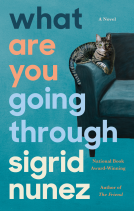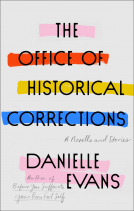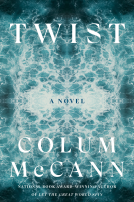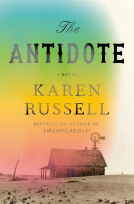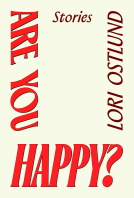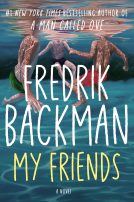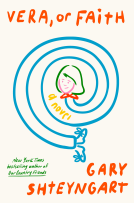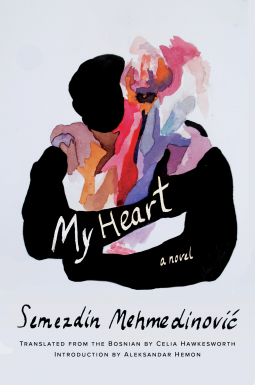
My Heart
A Novel
by Semezdin Mehmedinovic
This title was previously available on NetGalley and is now archived.
Send NetGalley books directly to your Kindle or Kindle app
1
To read on a Kindle or Kindle app, please add kindle@netgalley.com as an approved email address to receive files in your Amazon account. Click here for step-by-step instructions.
2
Also find your Kindle email address within your Amazon account, and enter it here.
Pub Date Mar 09 2021 | Archive Date Mar 09 2021
Talking about this book? Use #MyHeart #NetGalley. More hashtag tips!
Description
"Today, it seems, was the day I was meant to die." When a writer suffers a heart attack at the age of fifty, he must confront his mortality in a country that is not his native home. Confined to a hospital bed and overcome by a sense of powerlessness, he reflects on the fragility of life and finds extraordinary meaning in the quotidian. In this affecting autobiographical novel, Semezdin Mehmedinovic explores the love he and his family have for one another, strengthened by trauma; their harrowing experience of the Bosnian war, which led them to flee for the United States as refugees; eerie premonitions of Donald Trump's presidency; the life and work of a writer; and the nature of memory and grief.
Poetically explosive and pure to the core, My Heart serves as a kind of mirror, reflecting our human strengths and weaknesses along with the most important issues on our minds--love and death, the present and the past, sickness and health, leaving and staying.
Advance Praise
A Book Riot Must-Read Book in Translation
“An interrogation of a Bosnian past from a place of trauma and displacement, which parallels the turnstiles of love and family, themes and topics around which the book’s heart is centered . . . There’s no other writer who conveys with such grace what can happen to the heart—physical, emotional, and in its memory. This will be one of the best books of 2021.” —Literary Hub, One of the Most Anticipated Books of the Year
“A marvel of thoughtfulness and love.” —Aleksandar Hemon, Literary Hub
“An intimate, yet profound and lyrical portrait of a man and his family . . . Superbly translated by Celia Hawkesworth, My Heart is an introspective, literary journey worth taking.” —Booklist (starred review)
“Mehmedinović’s poetic side reveals itself via achingly beautiful imagery and recurring motifs. And he is a remarkably prescient observer of America . . . A deeply personal and incisive look at memory, anchored by astute observations.” —Kirkus Reviews
“A powerful autofictional gut punch of a novel . . . Few books are this good at capturing an immigrant’s sense of loss.” —Publishers Weekly (starred review)
“Intelligent, honest, and full of heart, Mehmedinović's novel has all the qualities one might seek in a friend. Like a friend, it is honest enough to tell you even the harshest of truths, and, like a true friend, it ensures that you will never feel alone while you read it, even in its most heartbreaking moments.”—Etgar Keret, author of The Seven Good Years
“My Heart is a family memoir, a personal account, a travelogue, a history, an immigrant story, and more, much more. A brilliant, unforgettable book, concise yet expansive, both microscopic and universal in its scope. It’s a record of the everyday, of the quotidian as informed by our PTSD. An astonishing achievement.” —Rabih Alameddine, author of An Unnecessary Woman
“Mehmedinović’s language is simple, but only because his vision is clear; his sentences are determined and peaceful, as though conditioned by an inner calm rooted in his indelible wandering worldliness—there is a stable center of love inside him, necessary in a world that is inherently unstable.” —Aleksandar Hemon, author of The Lazarus Project
“One of the most endearingly ruminative, sweetly sorrowful short novels I have ever encountered. A quietly devastating portrait of grief and loss, the soul-ache of exile, and the sustaining power of familial love, My Heart broke mine.” —Dan Sheehan, author of Restless Souls
“Readers will discover that Mehmedinovoić’s powerfully affecting and honest tale of the dizzy perimeter of mortality is also the oldest and best kind of story: one of love.” —Rivka Galchen, author of Atmospheric Disturbances and American Innovations
Available Editions
| EDITION | Other Format |
| ISBN | 9781646220076 |
| PRICE | $27.00 (USD) |
Featured Reviews
 Kasa C, Reviewer
Kasa C, Reviewer
Although he is revered in his homeland, the former Yugoslavia, Semezdin Mehmedinović is not familiar to the English speaking world, and yet his writing is so beautiful, his feelings so close to the surface, his family ties so strong, he should be. His first collection to be translated, Sarajevo Blues, evidently covers experiences during the siege of that city. Composed of three novellas, My Heart describes pivotal experiences while his family lived as refugees in the United States. Paramount is a search for identity and home, for example, re-visiting apartment complexes they'd only inhabited for several months at a time.
In the first, the eponymous My Heart, Mehmedinović describes his heart attack at the age of 50 and his realization of his own mortality and regrets at the road not taken, the paths not chosen. In Red Bandana, on a road trip with his 33 year old son through the American desert, he attempts to forge a relationship with his only son, meeting roadblocks both external and interior: "...in the American desert, I was more a foreigner than you were. And in fact, I am a foreigner everywhere in the world: as soon as I leave my home, I step into a void." This desert sojourn affords him the ability to muse at length on the nature of home, the quality of his father/son bond, and the importance of memory. ("...the car is an instrument of time.")
The nature of memory is examined more closely in Snowflake, the third story, which deals with his wife's stroke and loss of short term retention. The importance of shared experience, no matter how small or seemingly insignificant, forms the bulwark of relationship. And while Mehmedinović does not spell it out, the fact that, according to his backleaf bio, he moved back to Sarajevo in 2016, speaks volumes. This is one of the most beautiful, heart wrenching books I have ever read.
This autobiographical novel is unlike any I’ve read before. It’s deeply fascinating to read about someone’s loneliness and loss of language... in translation. Reading MY HEART was like meditating: such a strong sense of the present moment, despite a complicated longing for the past. Mehmedinović’s writing is stunning, his observations poignant. I screenshotted several pages, highlighted them and drew hearts, crying faces. This is an exploration of different types of solitude, of forgetting, and of time (which he cleverly compares to Dalí’s The Persistence of Memory. Highly recommend this one; major thanks to NetGalley and Catapult for my copy.
For an American reader, there’s something Hemingway-esque in Mehmedinovic’s minimalist style and gradual exposition. Moments of poignant imagery and raw emotion are given in distilled, poetic detail. My Heart brings this effect to depiction of immigration, life-changing medical events, and relationships between father and son and husband and wife. While it seems as if this would be too much to cover, the organic nature of Mehmedinovic’s writing turns it into something that feels like life in all of its complex messiness. At times, location in time and space can be difficult to follow, but again, as with Hemingway, a reader must simply trust the artist and his art.
Thank you to both author and translator, to Catapult, and to NetGalley for an Advance Reader Copy in exchange for an honest review.
A deeply felt meditation on home and family, and the impermanence of both.
The mood in Mehmedinovic's autofictional story may best be described as melancholy, so much so that at times it felt hard to continue. It was the shimmering light of love shining through all that kept me reading and made every page worthwhile.
The book reads a bit like an art film, panning across a country and a life, through images, musings and questions. Though relatively short, it asks the reader to slow down, to stay awhile, to engage with each of these, as if in direct conversation with the author. It is stimulating and engaging, even well after the last page.
 Karissa M, Reviewer
Karissa M, Reviewer
My Heart is a gentle, contemplative read. It is like reading the journal of a man who knows he is living the second half of his life. The first half has been full of drama and movement while the second half remains uncertain. The book is presented as a novel but there are clearly large influences of Mehmedinović’s own life, from the names of the characters to their history in Sarajevo.
The narrator, who bears Mehmedinović’s name, is a writer, a resident of the United States, a man who lived through the siege of Sarajevo with his wife and son before moving to the US in the early 1990s. His son is now an adult, a successful photographer, while Mehmedinović and his wife, Sanja, have settled in an apartment in Washington, DC. In the first section, the narrator has a heart attack and we follow him through his stay in the hospital and in the aftermath as he recovers. In the second section, Mehmedinović travels with his son, re-visiting some of the places they lived when they first arrived in the US, and watching his son do his photography work. In the third section, Sanja suffers a stroke and here she is hospitalized and we follow Mehmedinović as he navigates her care afterward. Sanja’s memory suffers and she struggles in the aftermath of the stroke and Mehmedinović must face that she will likely never quite be the same and how this changes their relationship.
Each section is slow and thoughtful. There is not a lot of action and yet the book is very readable. Mehmedinović’s voice is gentle and methodical. His descriptions of the world around him are simple but beautiful, grounded in the physical. This is particularly moving as he navigates first his own health crisis and then his wife’s. Even when it is clear that he has to have survived his heart attack, there is tension reading about the experience, the moment in which he thinks he will die. There is tragedy and deep love as he struggles to support Sanja after her stroke, and begins to understand that she has entered a new stage of life, that things will not simply return to how they once were.
Sarajevo is a constant background to Mehmedinović’s life. While we don’t get many stories of his experience during the siege, the book is full of references to it, to what their life was like in Sarajevo beforehand and what it was like in the early days of their move to America. In the end, it’s a rather brilliant portrayal of trauma. Mehmedinović and Sanja and their son might not look like traumatized people in the course of their daily lives but as we follow them through a variety of situations, we see how that trauma follows them, informs their decision making. Mehmedinović subtly shows us the trauma of leaving behind your home, your language.
Language is a recurring theme too that Mehmedinović explores. The language that Sanja loses after her stroke. The fact that Mehmedinović speaks and works in English but writes in his native language, Bosnian. When this was pointed out within the book’s narrative, I found myself startled; I had forgotten that this was a translation. And I think this speaks to the quality of this translation into English by Celia Hawkesworth, that I forgot completely that she existed.
Having now read Semezdin Mehmedinović’s contemplative work on aging and later life, I’m very curious to return to his earlier work and explore his literary history.


